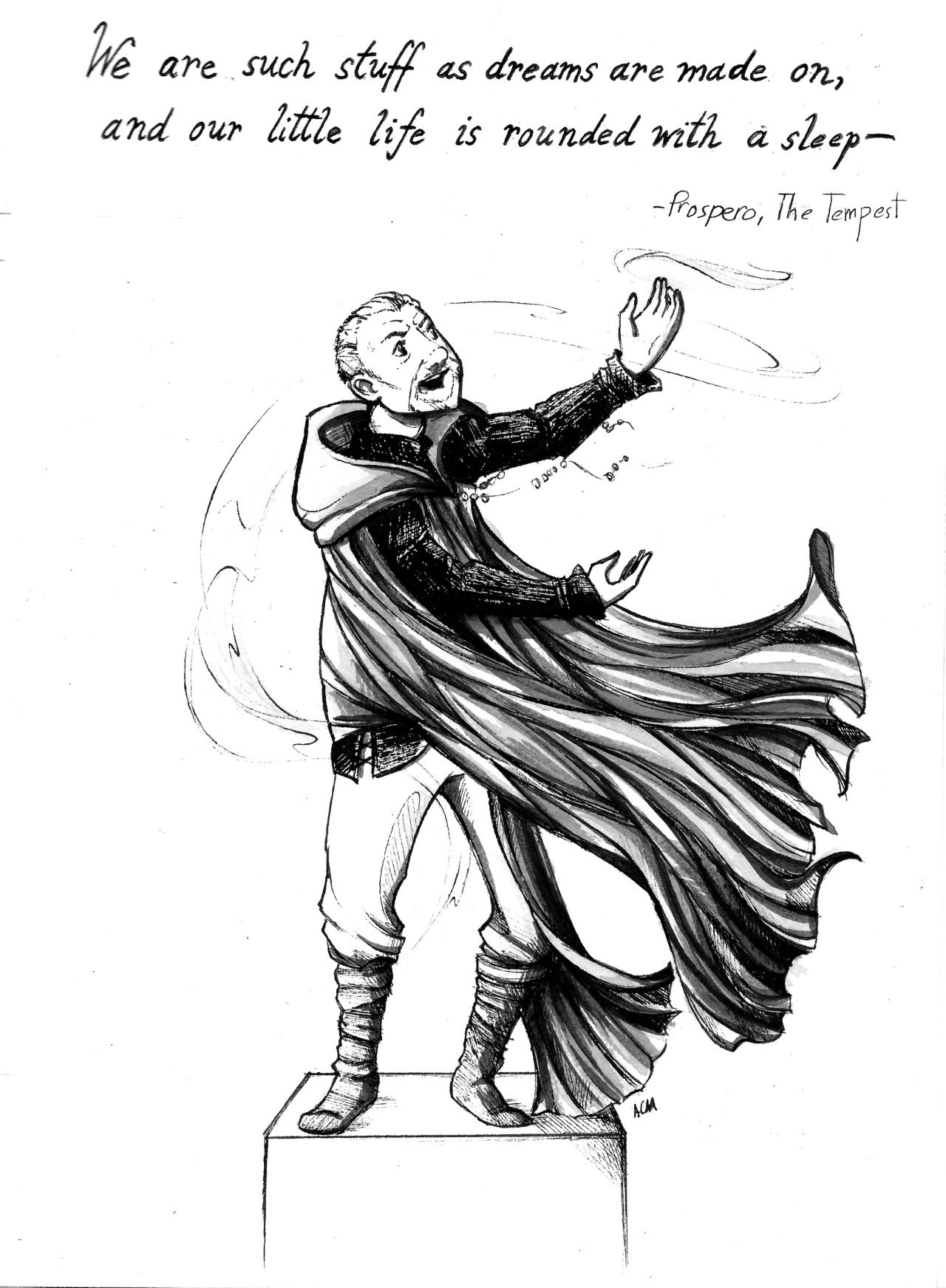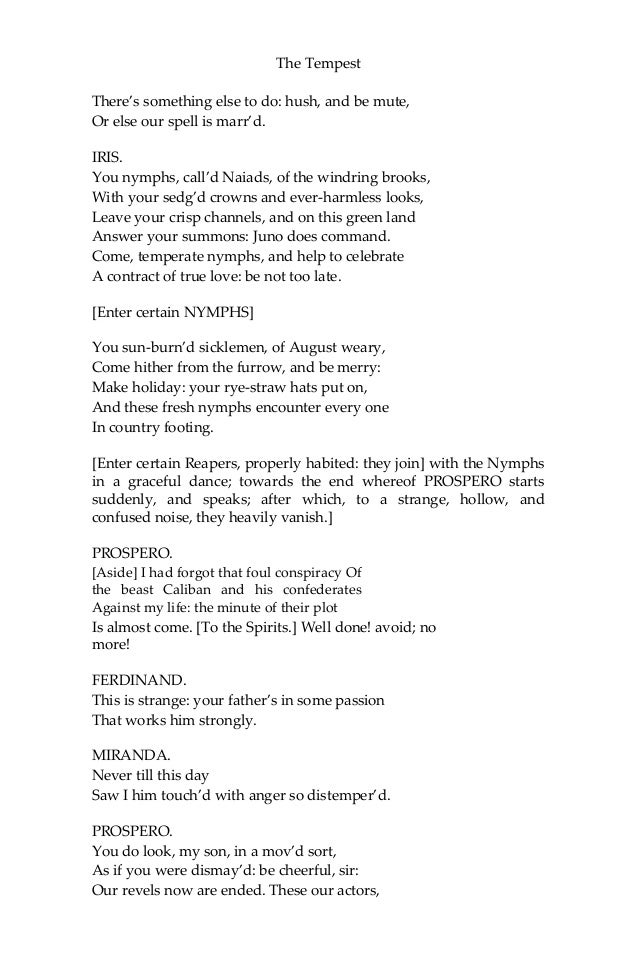“Our revels now are ended” Party-time is over, kids. But as it turns out, the party isn’t real, isn’t tangible. It's up to interpretation whether 'Our revels now are ended' begins an extended metaphor of a playwright signaling the end of his career.
Our Revels Now Are Ended Quote
Condolences have come in from all over the country on the passing away of theatre doyen and art connoisseur Ebrahim Alkazi (18 October 1925 – 4 August 2020). However, what touched the heart was a Facebook post by Kumara Varma, who was schooled in theatre direction at the National School of Drama (NSD) and spent a lifetime in Chandigarh doing memorable plays and later heading the department of Indian theatre at Panjab University. Posting a black and white portrait of Alkazi, Varma quotes Shakespeare from The Tempest: “Our revels have now ended. These our actors, As I foretold you, were all spirits and, Are melted into air, into thin air.”
Now settled in his home state of Kerala at Trichur, Varma says: “These are the lines that came to my mind when the news of Alkazi’s passing away came and one says with humble pride that whatever one learned was from him. He shaped modern Indian theatre and it was he who set the tradition of translating plays written in different regional languages all over the country and staging them in Hindustani. His repertoire was thus truly pan-Indian”.
© Provided by Hindustan TimesShakespeare Farewell
Director Ebrahim Alkazi ()Legend of Tughlaq
With this we come to the spectacular production of Girish Karnad’s Tughlaq, which was originally written in Kannada and translated for Alkazi by yet another brilliant director-musician of modern Indian theatre, late BV Karanth. Karnad was to say thus of Alkazi: “His fundamental contribution was to devise a methodology of theatre training which has continued after him, and to create a body of actors and directors which transformed the notion of theatre at the grassroots.” Interestingly, Alkazi first assigned Om Shivpuri to take up Tughlaq as a student production. Karnad was acknowledge that it was immaterial that these were only student productions: “Doors that we, in our vernaculars did not even know existed, had begun to open.”
Karnad, who sourced his plays from myth and history, wrote Tughlaq in 1964, based on the maverick life of the 14th century Sultan of Delhi, Mohammad Bin Tughlaq.
Alkazi as the founding director of NSD from 1962 to 1977, in those 15 years, directed to perfection many plays, yet his three definitive works to be staged in the backdrop of Delhi’s Purana Qila were Andha Yug, Razia Sultan and Tughlaq. The last which he first staged in 1962 is counted as one of the best productions the country saw in modern times is because it brought together some of the best talents of the country: Alkazi, Karanth, Karnad and of course the famous actor Manohar Singh, the Himachal boy who was groomed by his teacher to be one of the best actors on stage. Manohar was the first and only choice of Alkazi, who said: “Manohar had the aristocracy of spirit, nobility of soul and complete humility in understanding and enacting a role.”
Varma, who played the junior guard recalls, “The play had passed from history into legend while it was still being enacted. Artiste Kamal Tewari recalling the magnificent and unparalleled performance of Manohar Singh, says: “I was included in the production playing one of the conspiring Ameers and I remember the slap Manohar Singh gave me sent me hurling some six feet away”. Veteran actor Rani Balbir Kaur adds, “I travelled a number of times till the play was active to see it and each time it was a great experience. What dialogue delivery by Manohar Singh! I first met Kumara Varma there playing the young guard to whom Manohar renders the famous speech ‘Umangon bhari umar hai, Khwab dekhne ki umar, Saare aalam ko jeetne ki umar’ (It is your age of exaltation, The time to indulge in dreams, The time to conquer the whole world)’.”
Flash forward to 1980s

It was in the mid-1980s during a meeting with actor Meeta Vashisht, who one knows from her Chandigarh theatre days, at the NSD hostel. One got talking about Tughlaq. Meeta recounted that the boy students would down beer, strip off most of their clothing and recite the dialogues of Tughlaq till late at night. Not surprising for that’s how it was and is in boys’ hostels. The young ones were giving an irreverent tribute but a tribute nevertheless. At the same time they were practising dialogue delivery at its best. Yes, and as a friendly neighbourhood journalist one had the privilege of spending a few evenings with Manohar Singh who would pick up the play and recite some of the dialogues. I earned his wrath when I once dosed off a little in the middle of the renderings and he told me to get up, fix myself a drink, and carried on reciting.
Such was the magic of Tughlaq, a political play that was written on the faultline of Nehruvian socialism, yet in such a manner that it reached out to all in its multilayered delineation to one and all.


Sign on to read the HT ePaper epaper.hindustantimes.com
Didja miss me? As I write this, I’m at anchor, if that’s still the term, in New York harbor, waiting to disembark after a week on this Dome-of-Pleasure cruise ship.
It has been a week of incredible luxury! And the best part is, our fellow passengers: they are not the 1%, they are definitely the great American middle to lower class, who give the impression of having been raptured into this utopia in the clothes they stood up in.
(We did this last year, too, and I’d be happy to share what I wrote up then. Such a trip wouldnt be my choice; I loooove Winter! But my BMD is less enamored of it. )

OTOH: not gonna lie: lo, going first class on a luxury cruise ship sucketh not, neither doth it bite.
God willing, we will be released back onto the mainland in only two hours now—unless someone turns up sick…and the fact that I’m anxious about that possibility shows how our world has been transformed by this new virus.

We aren’t the same country now as we were only at Christmas, are we? Then, we could hug and kiss, we could travel, we could assemble where we wished, we could eat and drink together with abandon!
Did someone have a cough, maybe a fever? So what? Big deal, ‘tis the season for those minor transitory nuisances!
Do you love anyone whose health is compromised? Do you love anyone so precious to you that her death would make you welcome yours?
I do. My darling sister, undergoing chemo. Modern medicine is “saving” her at the, until recently, acceptable cost of weakening her immune system. That iatrogenic weakness is now in itself a terrifying peril.
My impossibly beautiful daughter, who had been scheduled to go to Italy over Spring break. I was so relieved when the University cancelled that trip! But wait: is she really any safer at Harvard, a cosmopolitan community…?
How I long to see them, more than ever now that we’ve all received this Memento Mori! But—what if I am one of the asymptomayic carriers of the virus? Even traveling between my region of our country and theirs might prove hazardous. An embrace from me might be deadly.
Farewell the tranquil mind.